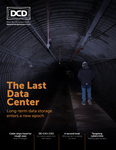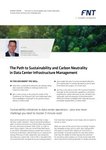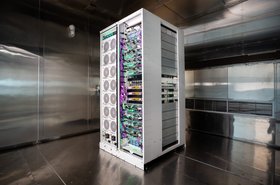According to the German Datacenter Association, the Federal government is making a big mistake. The authorities are considering an Energy Efficiency law which the GDA believes will effectively prohibit new data centers.
The GDA has set out its reasons for objecting to the proposed law. It complains that the authorities are regulating issues they don't understand.
But I think on one level, the data center sector has brought this trouble upon itself.
If you can't stand the heat...
The draft Energy Efficiency Act (ENEfG), currently in draft form, aims to set out a legal framework for energy efficiency, and includes mandatory requirements for heat reuse and energy use.
One of the controversial requirements is that new data centers should have 30 percent of their waste heat used by other organizations from 2024, and 40 percent from 2027. The GDA's Anna Klaft says this is a big ask.
She's right of course. Anyone reading this site should be aware that reusing data center heat has been an uphill struggle. Today's air-cooled data centers generally produce heat at a low temperature which isn't very useful, and they aren't normally close enough to district heating systems for anyone to actually be able to use their heat.
Klaft says the proposed Act is "simply unrealistic: the use of waste heat is in the single-digit range for all currently practiced constellations."
Fine, but for some reason, the German authorities have got it into their heads that heat reuse is a marvelous opportunity, and data centers ought to be stepping up to the plate.
And where might this idea have come from? I'm, afraid it is from the data center industry itself.
The Germany's Internet grouping, eco, nas set up a Digital Infrastructures group - and that body has said publicly that data center waste heat could provide all the heating required in Frankfurt.
Here's the quote, from this page (Google translation): "Through the consistent use of waste heat from data centers, all living and office spaces in Frankfurt am Main – the seat of the world’s largest Internet exchange node – could be heated in a CO2-neutral manner by 2030."
Germany's government is looking urgently to decarbonize stubborn parts of the economy, like heating. The tech sector has said it has the solution. It effectively called on the government to act. So It's no wonder the government has asked the sector to stump up.
You're asking for regulation
Max Schulze of the Sustainable Digital Infrastructure Association has seen this massive PR problem coming. The industry is making grandiose promises to create jobs, digitize society, and decarbonize other industries.
If they are claiming to be critical to everyone's life, he says, that is "literally asking to be regulated". The authorities are simply calling for what the industry has promised them.
And politicians simply cannot rely on smooth promises which aren't backed by measurable actions. They want to see the sector deliver actual benefits. They want to know what is going on inside data centers, and make sure they are doing what they say they can do, says Schulze: "How else will we protect our citizens and ensure our infrastructure is available? "
You can see this effect in all sorts of places. The Amsterdam sleeping server war, is a good example. The city asked data centers to switch off servers which aren't in use. In their terms, that's as reasonable as asking your child to switch off lights and close doors to save energy. But the industry can't do it, because it's not set up that way.
If your industry isn't actively working to reduce its impact, and cooperate with the rest of the world. then it's part of the climate problem. And that cooperation can't be entirely on your own terms. It has to work, and be understandable, on other people's terms.
The sector has had years to prepare itself for the regulations it knew were coming.
Now the regulations are imminent, the industry is pushing the onus onto consumers. In a joint position paper with Bitkom and eco, the GDA says data centers are "ready to give their waste heat free of charge or at low cost", but this potential for heat use is "largely untapped". because district heating systens are old and undeveloped. Their suggestion: if data centers are ordered to share their heat, consumers should have an "acceptance obligation" forcing them to use it.
Reporting directive
At a higher level,, the EU has a Corporate Sustainability Reporting Directive which will affect our industryto be more forthcoming about data centers' impact on the environment.
European data center operators have prepared, with the Climate Neutral Data Center Pact which has agreement from the European Commission to apply self-regulation to the industry. The Pact is transparently an effort to avoid external regulations.
But as climate change requirements begin to bite, it is obvious that this sort of approach, while useful, is not going to be enough. No industry has the right to make its own rules entirely..
The data center industry is going to have to prepare itself for some uncomfortable conversations like the ones going on in Germany right now.
In this case, if the government wants heat reuse, the industry actually has a limited range of options. It can
- Buckle down and deliver the heat reuse it promised. If it's going to do that usefully it will probably mean shifting to liquid cooling so it produces useful heat, and taking a big hit on some of the infrastructure costs involved in hooking up to district heating systems.
- Get realistic about what is possible. And that could mean apologizing for making blatantly unrealistic promises.
- Maybe not building so many data centers. Data center operators are subject to their local governments. If those governments want your heat as a condition of building data centers, and you can't deliver it, then tough. You can't always build all the data centers you want.
The data center industry got itself into this bind. Let's make sure that getting out of it involves some actual realism.





